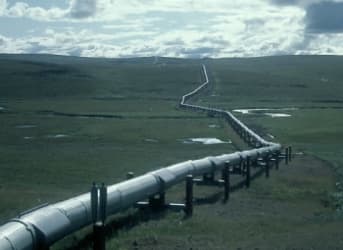Canadian pipeline company TransCanada announced its Mexican subsidiary was given a contract by the federal power company there to build a 329-mile natural gas pipeline for the state. The company said the project was part of an effort to help move the country away from fuel oil to cleaner-burning natural gas. Further north, the Nebraska government said it issued a draft report on the Keystone XL pipeline, saying a revised route effectively avoided a sensitive ecosystem in the state. At home, TransCanada said it was teaming up with Chinese partners to press for a crude oil pipeline for western coasts. While the company's economic influence doesn't have the dominance of Russia's Gazprom, its pipeline ambitions suggest it aims to take a leadership position in North American transit networks.
Russian energy company Gazprom this week announced it reached investment decisions with the Serbian and Hungarian government for its South Stream natural gas network. The planned European gas network is part of Russia's efforts to diversify export routes given protracted economic conflicts with Kiev. For the country's east, the company said it was moving ahead with plans for a 2,000-mile pipeline network that would tap into natural gas deposits in the arctic Chayandinskoye field. That pipeline, the company said, means it's "going to build a unified gas supply system across the whole country, from the west to the east."
Related Article: Putin Plays Down Russia's Deadly Dependence on Oil & Gas Revenues
Canadian pipeline company TransCanada has enjoyed similar successes in recent weeks. The company announced that its Mexican subsidiary secured a contract from Mexico's federal power company CFE to build, own and operate a 329-mile natural gas pipeline for the country. Russ Girling, the pipeline company's top executive, said the contract is a reflection of Mexico's move away from fuel oil to natural gas. This, he said, meant "there will be additional opportunities" for his company in Mexico.
In the U.S., the Nebraska Department of Environmental Quality said, in a draft report, that the company's latest plan for the Keystone XL pipeline through the state avoids a region, the Sand Hills, considered a sensitive ecosystem and key source of regional drinking water. The report potentially clears a hurdle for a pipeline considered a panacea for economic recovery in the United States by its supporters and emblematic of what's wrong with U.S. energy policy by its critics. The pipeline would stretch 875 miles from the U.S.-Canadian border to Steele City, Neb., and ultimately uncork bottlenecks at the Cushing, Okla., trading hub.
At home, meanwhile, the company said it was teaming up with Phoenix Energy Holdings, a unit of PetroChina, to press for a 310-mile crude oil pipeline from the Athabasca region of Alberta province to the Edmonton area. That move follows a string of foreign investments in the Canadian oil sector that sparked widespread criticism of the administration of Prime Minister Stephen Harper. Girling, in a statement, said the new proposed pipeline was "critical" given the surge in crude oil production from Canada.
Related Article: Putin Strengthens his Grip on World Energy with TNK-BP Deal
Early this year, the European Commission announced it was looking into whether or not Gazprom abused its market position in Eastern Europe. In Canada, the National Energy Board told Girling in a letter it was conducting an audit of the company and all of its regulated subsidiaries. Sheri Young, secretary of the NEB board, told Girling she was interested in reviewing TransCanada's "policies, practices and procedures" as they pertain to onshore pipeline regulations. While Young's concerns in no way compare with Europe's anti-trust probe into Gazprom's operations, TransCanada's North American ambitions are starting to garner widespread attention.
By. Daniel J. Graeber of Oilprice.com


















